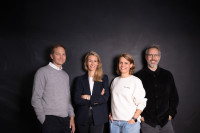The Power of the Obvious: Why the Best Ideas Often Sit Right Under Our Noses
„Big ideas are so hard to recognize, so fragile, so easy to kill. Don't forget that, all of you who don't have them."– John Elliott Jr.
When the first iPhones hit stores in 2007, Nokia managers mocked the device without a physical keyboard. “No one will want to type on glass,” was the consensus. Today, the iPhone seems so obviously right that we wonder: how did everyone else miss it? Apple revolutionized an entire industry—not with entirely new technology, but with a simple realization: people want one device that can do everything, instead of carrying three separate ones.
That’s the power of the obvious. The biggest marketing and business successes of our time rarely rest on complex innovations. They emerge when someone sees the obvious, says it out loud, and executes it consistently—while everyone else overlooks it.
Kim Notz
09. September 2025
The paradox of invisible simplicity
Why are the simplest ideas so hard to spot? The answer lies in three psychological traps—ones we marketers step into with alarming regularity:
The expert trap: the deeper we are in a subject, the blinder we become to the obvious. We search for sophisticated strategies, and in doing so overlook the simple truths our audience already grasps.
Complexity bias: we subconsciously believe that hard problems need complex solutions. Yet history keeps showing the opposite. Steve Jobs (and, to be precise, Leonardo da Vinci long before him) put it succinctly: “Simplicity is the ultimate sophistication.”
Organizational blinders: we’re so entangled in our frameworks, processes, and KPIs that we forget to look through our customers’ eyes. The obvious disappears behind data noise and buzzwords.
When the obvious moves billions
The most successful companies of the last decade share one thing: they didn’t reinvent the wheel; they rethought the self‑evident.
Airbnb recognized: some people have space, others need space. Obvious? Absolutely. Revolutionary? Definitely.
Uber understood: nobody wants to wait twenty minutes for a taxi when a smartphone can show where the next one is. The technology already existed; it took the courage to embrace simplicity.
Spotify realized: people don’t want to own 1,000 CDs, they want to listen to 1,000 songs whenever they want. Daniel Ek turned this banal insight into a $144‑billion company.
Marketing shows the same DNA of obvious simplicity:
Snickers articulated a universal truth everyone knows but no one had expressed so clearly: “You’re not you when you’re hungry.” Five words that nail the obvious. So obvious that a new term took hold: “hangry”—the perfect blend of hungry and angry. The campaign works not despite its simplicity, but because of it. These messages resonate because they state a universal truth that everyone knows, but no one had put into words so crisply.
The courage to embrace strategic “boredom”
The hardest part about the obvious isn’t seeing it—it’s having the courage to champion it. In meetings, simple ideas are quickly dismissed as “boring” or “not innovative enough.” Creatives want to be creative, strategists want to look strategic, and leaders want to justify complexity.
But the strongest brands have understood: consistency beats novelty. Clarity beats complexity. The obvious beats the intricate.
McDonald’s has sold the same promise for decades: fast, affordable, the same everywhere. Obviously boring—and obviously successful.
What to do now
The power of the obvious is waiting to be discovered—but only by those willing to look instead of look away, to simplify instead of complicate, to question instead of accept.
The next big idea isn’t hiding in endless brainstorms, complex studies, or Silicon Valley. It’s where it’s always been: right under our noses. We just need the courage to see it.




